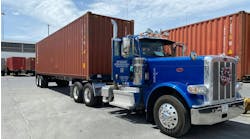Truck driver wages are on the upswing and pay is expected to jump sharply next year as more drivers reach retirement age, according to transportation experts and fleets themselves.
“The number of U.S. males reaching the retirement age of 65 is really going to spike in 2012, yet the number of 21-year-old males getting their CDLs [commercial driver’s license] has essentially flat-lined,” Kenny Vieth, president and senior analyst with ACT Research Co., told Fleet Owner. “Thus the traditional pool of driver candidates is going to shrink.”
That shrinkage results from a huge “generational shift” now occurring in this U.S., with 77 million “baby boomers” poised to retire over the next two decades, replaced by only 46 million new workers, according to numbers tracked by the American Society for Training and Development (ASTD).
That “generational shift” is nowhere more acute than trucking, where the average age of an owner-operator today is 49.6, while the average age of a company driver hovering around 48.6.
Fleets themselves believe drive pay increases are the inevitable byproduct of this and other trends. For example, a new national survey conducted by Transport Capital Partners (TCP) indicates that nearly 93% of carriers believe driver wages are heading up, perhaps 10% or more, in the year ahead.
According to data gleaned from TCP’s Second Quarter Business Expectations Survey, two-thirds of the carriers expect wages to increase between zero and 5%, comparable to the first quarter’s survey results, but those carriers anticipating a 6 to 10% increase more than doubled to 28%, up from 12% in the previous survey. None of the carriers surveyed by TCP believe wages will fall over the coming year.
Richard Mikes, TCP partner and survey founder, noted that larger carriers with over $25 million in revenue were more likely to expect an increase in wages exceeding 5% than smaller carriers.
“The larger carriers apparently are feeling the pressure first as the driver pendulum is swinging to the more typical levels of this phase of the supply demand cycle and truck capacity is tightening both because of lack of equipment as well as now drivers,” he noted.
However, fewer large carriers expect wages to rise more than 10% in the year ahead when compared to data from TCP’s first quarter survey.
Gordon Klemp, founder and president of the National Transportation Institute (NTI), which tracks truck driver wage data, said last month that the imposition of tighter regulations may shrink the available pool of truck drivers even further, necessitating much larger pay increases.
He believes the Federal Motor Carrier Safety Administration’s (FMCSA) new Compliance, Safety, Accountability (CSA) program will eliminate about 2% of the driving population with 6% of the drivers flagged as undesirable. Klemp also thinks that if FMCSA’s proposed revisions to hours-of-service rules are adopted, TL driver productivity will be cut by 15%, forcing fleets to hire more drivers in order to complete the same amount of work.
Further, Klemp believes carriers moving to hair follicle pre-employment drug screening could eliminate additional applicants compared to the less-reliable urinalysis drug screens.
Higher pay is thus one of the strategies fleets are pondering as a way to beef up their driver ranks. According to TCP’s survey, just over 40% of carriers believe pay scales must be between $50,000 and $60,000 to attract and retain drivers. Approximately 30% think that number exceeds $60,000 with about 10% expecting to pay between $70,000 and $80,000.
Of larger carriers, 72% think the ideal wage would be between $50,000 to $70,000 a year, but no one believes drivers will be enticed by pay scales below $40,000 a year, TCP’s Mikes notes.
Short term, NTI’s Klemp projects that TL fleets will need to increase pay by 3 to 5 cents per mile over the next 12 months as capacity tightens.
Smaller carriers, however, tend to believe that top wages are not necessary to recruit and retain drivers, according to TCP’s data, with 53% believing wages can be between $50,000 to $60,000 compared with only 37% of the larger carriers. TCP also believes the ability of smaller carriers to get drivers home more often plays a role.
Yet higher wages may in many cases simply be inevitable for fleets of all sizes, thinks ACT’s Vieth. “Back when the industry was deregulated in the 1980s, the average truck driver made about four times what the average fast food worker made. Now, truck drivers make just twice as much,” he explained. “As a result, over the last 30 years, driver wages increased below the rate of inflation. So now they’ll have to rise above the rate of inflation in order to attract more potential candidates.”



